EPUBLIKA.CO.ID, JAKARTA -- Former secretary of the minister for state enterprises (BUMN) Said Didu said he regretted Parliament's plan to reject a government proposal for capital injections into state companies especially state banks.
The rejection will leave state banks in difficulty for expansion and in financing development projects of the government with limited capital they have, Didu said here on Thursday.
On Wednesday House Commission XI chairman Fadel Muhammad said the capital injection proposed by the government for most of 35 state companies will likely be rejected.
The government will proposed capita injections totaling Rp72 trillion for 35 state companies.
"The reasons given for the capital injections are not convincing," Fadel said.
The Commission XI will have a hearing with the finance minister on the capital injections on Thursday.
Didu said state banks would need large additional capital to be able to finance big projects of the government especially infrastructure projects.
"State lenders would have no much enough fund available if PLN (state power utility company) and Pertamina (state oil company) need fund for their projects," he said.
With state banks short of capital it is feared foreign banks would gain greater market share to exploit the huge credit market potential in Indonesia, he said.
"State banks will be a greater difficulty in market competition," he said.
State lender Bank Mandiri is to be given a capital injection of Rp5.6 trillion.
Said Didu said he wanted to warn the Parliament that rejection of capital injection for Bank Mandiri would allow foreign banks to take over the financing role.
State banks still have limited funds to finance development projects especially infrastructure projects, he said.
He called on the government to maintain the spirit to have strong state banks in facing the implementation of ASEAN Economic Community (AEC) by the end of this year.
Under AEC, most of the tariff barriers among the 10-member countries would be abolished.
He said with the capital injection Bank Mandiri is expected to emerge as a Qualified Asean Bank (QAB).
Malaysia and Singapore already have banks with the category of QAB that would be free to expand to any country in ASEAN without any restriction, Didu said.
Meanwhile, Head of Strategic Research and Analysis Network of Market Investor (NMI) Reagy Sukmana rejection of capital injection for Bank Mandiri will leave Indonesia a minor player in banking business in the region.
"Our state companies are not only foreign exchange earners but also agent of development," Reagy said.
He said he is optimistic Bank Mandiri, as the country's largest lender, could play a greater role in financing infrastructure projects to accelerate economic development.
"The Parliament members should be more visionary. If they fear misuse of the fund, they could tighten control, instead of rejecting the capital injection," he said.


